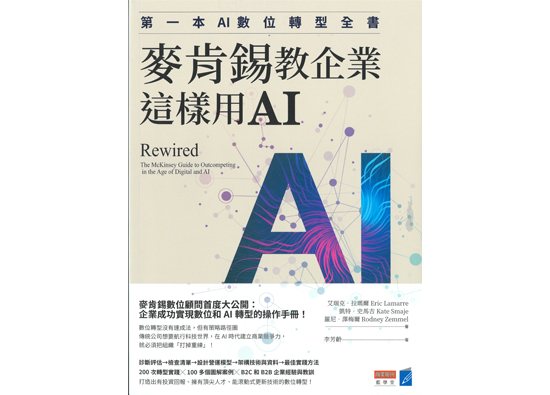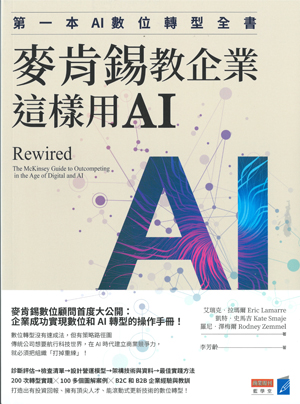01.2025 Life Guide
Good book recommendation: McKinsey teaches companies how to use AI in this way
Far Eastern Group Chairman / Douglas Hsu


 Author: Eric Lamarre , Kate Smaje , Rodney Zemmel
Author: Eric Lamarre , Kate Smaje , Rodney Zemmelpress: Business Weekly
Publication date: July 18, 2024
AI technology is developing at an astonishing pace. According to the "2024 Work Trends Index" report jointly released by Microsoft and LinkedIn, the use of generative AI in the workplace has significantly increased in 2024, not only redefining daily work patterns, but also becoming a key factor for enterprises to cope with the new situation. Successful digital transformation can significantly enhance enterprise value, however, not all companies can master the essentials of transformation, especially for traditional enterprises, which require the determination to "break down and retrain" the organization. The McKinsey Digital Consultant team fully explains in this book how to use AI to win and reward the transformation strategy of enterprises.
Successful transformation involves not only technological changes, but also adjustments to organizational structure, operational models, and corporate culture. The complex process often leaves companies unsure where to start. This book points out common issues in digital transformation and provides specific implementation guidelines to assist in developing a clear roadmap. In short, companies need to work hard in five key areas:
1. Strategy and Business Model: Redefine the mission, vision, and strategy of the enterprise, and establish new business models.
2. Customer Experience: Create personalized, intelligent, and seamless customer experiences.
3. Operating model: Establish an agile, flexible, and efficient operating model.
4. Technology and Data: Utilizing technologies such as AI, cloud computing, and Big Data to drive innovation and growth in enterprises.
5. Talent and Culture: Establish a team with digital thinking and innovative spirit, and cultivate corporate culture.
In the initial stage of digital transformation, it is crucial to establish a common digital language across the organization, and appropriate transformation areas should be selected based on value potential and feasibility to determine priority areas. In terms of thinking, everyone must broaden their perspective, break away from the traditional framework of old businesses, focus on solutions that can bring significant benefits, and take creating value as the core goal.
To effectively implement digital solutions, companies must pragmatically assess their current basic digital capabilities and build differentiated advantage talents to create differentiated competitiveness. In addition to recruiting outstanding talents, it is also necessary to strive to implement value propositions that can inspire employees, while developing more agile and digital human resource processes, and creating an environment that can cultivate the best talents.
Unlike other types of transformations, digital and AI transformation requires more changes in skills. Therefore, in addition to mastering talent, developing a sustainable technological environment for digital innovation, as well as data that is easy to build and reusable, will be the key to success or failure, including APIs that connect different applications, value oriented cloud deployment, software development automation, secure and reliable security deployment, and AI technology that improves efficiency, innovates products and services, and optimizes decision-making processes for enterprises. Only by mastering relevant knowledge can we win in the digital world.
Digital transformation is an endless journey, the ultimate team movement for enterprises, and a culture that must be deeply rooted in the hearts of all Far Eastern people. The leadership plays a key role, and it is expected that all leaders can quickly transform their thinking and leadership styles, demonstrate determination, work together across departments, and explore more opportunities for Far Eastern Group in the AI era, "Master the Changes, Secure the Future"!
#




















